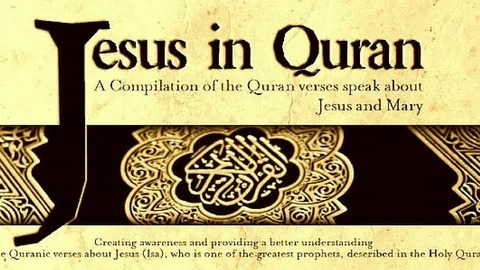In a world filled with diverse beliefs, Jesus Christ stands as a towering figure whose teachings and influence have left an indelible mark on humanity. While various faiths view Jesus from distinct perspectives, there’s an undeniable consensus that he was a prophet of God. This article on Arabian Tongue website delves into the life, teachings, and significance of Jesus A prophet of God, exploring the impact he has had on both religious and cultural fronts.
Who Was Jesus?

The idea of a prophet has a central place in many religious traditions, acting as a bridge between the divine and the human. Prophets are believed to be chosen by the Divine to convey important messages, guide people on the righteous path, and bring spiritual enlightenment. One of the most revered figures is Jesus a prophet of God.
Early Life and Background
Jesus of Nazareth was born in Bethlehem, a small town in the Roman province of Judea, now part of modern-day Israel. He was raised in a Jewish household, and his teachings often drew upon the rich traditions of Judaism. As he grew, his wisdom and understanding of spiritual matters became apparent to those around him.
Ministry and Teachings
At around the age of 30, Jesus began his public ministry, which lasted for approximately three years. His teachings emphasized love, compassion, and forgiveness. He delivered profound parables that conveyed moral and ethical lessons, and his messages resonated deeply with people from diverse backgrounds.
Miracles and Healing
Another aspect of Jesus’ ministry was his performance of miracles. He was believed to have the power to heal the sick, restore sight to the blind, and even raise the dead. These acts of compassion and divine intervention reinforced his message and drew many followers.
Recommend: Prophet Adam story.
The Message of Jesus: Proclaiming God’s Love
Jesus’ role as a prophet of God reverberates through history and faith traditions. the timeless message of Jesus stands as a beacon of hope and inspiration.
Salvation and Forgiveness
Central to Jesus’ teachings was the concept of salvation. He spoke of a path to eternal life through faith in God and the forgiveness of sins. His message offered hope and redemption to those who sought a deeper connection with the divine.
The Kingdom of God
Jesus frequently spoke about the “Kingdom of God,” a metaphor for a state of spiritual fulfillment and harmony. He envisioned a world where love, justice, and compassion prevailed, and he called on his followers to work towards the realization of this ideal.
Ethical Teachings
Jesus’ ethical teachings were revolutionary in their emphasis on compassion, humility, and treating others with kindness. He challenged societal norms, advocating for the marginalized and promoting a sense of community and unity among all people.
Read more: the Year of the Elephant.
Jesus as a Prophet: Perspectives from Different Religions

Views differed on Jesus in the heavenly religions and were represented in the following:
Christianity’s View
In Christianity, Jesus is not only considered a prophet but also the Son of God, the Messiah, and the Savior of humanity. His sacrificial death and resurrection hold central importance in Christian theology, offering redemption and eternal life to believers.
Islam’s Perspective
In Islam, Jesus (known as “Isa” in Arabic) is highly regarded as a prophet, one of the five greatest prophets in Islamic tradition. He is seen as a precursor to the final prophet, Muhammad, and his teachings are respected in the Quran.
Other Religious Interpretations
Beyond Christianity and Islam, Jesus is also viewed in various ways by other religious and spiritual traditions. Some see him as a wise teacher, while others appreciate his moral teachings and ethical principles.
Recommend: Abraham and Ismael .
Controversies and Debates
The presence of Jesus created many interesting topics that some exploited in its discussion from his point of view, and the views were as follows:
- Historical and Scholarly Debate: The historical existence of Jesus and the accuracy of the accounts of his life have been subjects of scholarly debate for centuries. Historians and archaeologists continue to explore the evidence, seeking to uncover a more comprehensive understanding of the historical Jesus.
- Theological Implications: The theological implications of Jesus’ prophethood extend beyond individual belief. They impact discussions about the nature of divinity, the relationship between humanity and the divine, and the meaning of salvation.
Impact and Legacy
Jesus’ teachings had a major impact, whether in religions or on societies, and most notably:
- Influence on Christianity: Jesus’ teachings laid the foundation for Christianity, shaping its core doctrines and ethical principles. His life and message continue to inspire billions of Christians worldwide, providing guidance for their spiritual journey.
- Global Impact: The influence of Jesus’ teachings is not limited to Christianity alone. His ideas of love, compassion, and forgiveness have transcended religious boundaries, shaping the moral fabric of numerous societies.
- Interfaith Dialogue: Jesus’ role as a prophet has sparked interfaith dialogue, promoting understanding and cooperation among adherents of different religions. His universal message of love and unity serves as a common ground for dialogue and cooperation.
Learn Now: Learn Tagweed Online.
Issa Prophet in Islam: Unveiling the Role of Jesus in Islamic Tradition

In the diverse tapestry of religious beliefs, the figure of Jesus Christ occupies a unique place, In Islam, prophethood is a cornerstone of faith. Prophets are believed to be chosen by Allah (God) to convey His messages to humanity. They guide people on the path of righteousness, urging them to worship and obey the One God.
Jesus as a Prophet
Within the Islamic tradition, Jesus (known as “Isa” in Arabic) holds a significant position. He is one of the esteemed messengers of Allah, sent to the Children of Israel to impart divine teachings and wisdom.
The Birth of Jesus: A Miraculous Event
The Virgin Birth One of the most prominent aspects of Jesus’ story in both Christianity and Islam is the miraculous virgin birth. Islamic belief asserts that Maryam (Mary) gave birth to Jesus without any human intervention, signifying the extraordinary nature of his mission.
Teachings of Jesus in Islamic Tradition
One of the most important religious teachings advocated by the Prophet of God Jesus and was compatible with Islamic traditions:
- Emphasis on Monotheism: Jesus, as a prophet in Islam, echoed the central principle of monotheism. His teachings align with the core Islamic belief in the oneness of God, rejecting the notion of associating partners with Allah.
- Compassion and Mercy: Islamic sources attribute qualities of compassion and mercy to Jesus. He is portrayed as a teacher who advocated for kindness and empathy, urging his followers to treat others with love and respect.
Jesus in the Quran

The Qur’an also mentioned many religious teachings and beliefs related to and from Jesus:
- References in the Holy Quran: The Quran, the holy scripture of Islam, acknowledges Jesus in multiple instances. He is often referred to as “Isa ibn Maryam” (Jesus, son of Mary) and is praised for his miraculous birth and noble character.
- Miracles and Healing: The Quran attributes several miracles to Jesus, such as healing the blind and raising the dead. These miracles serve as a testament to his divine authority and the mercy of Allah.
FAQs
Is Jesus only considered a prophet in Islam?
No, while Islam views Jesus as a prophet, Christianity considers him the Son of God and the central figure in its theology.
What are some of the miracles attributed to Jesus?
Jesus is believed to have performed numerous miracles, including healing the sick, walking on water, and turning water into wine.
Jesus challenged societal norms by advocating for the marginalized, treating women with respect, and emphasizing love and compassion.
Did Jesus have any siblings?
According to the New Testament, Jesus had siblings, including brothers and sisters.
What is the significance of the resurrection in Christianity?
The resurrection of Jesus is a central tenet of Christian faith, symbolizing victory over death and offering believers the hope of eternal life.
Conclusion
Jesus, a prophet of God, stands as a figure whose teachings and impact have spanned centuries and shaped the course of human history. His message of love, compassion, and salvation continues to resonate, uniting people from diverse backgrounds in a shared pursuit of spirituality and ethical living.


